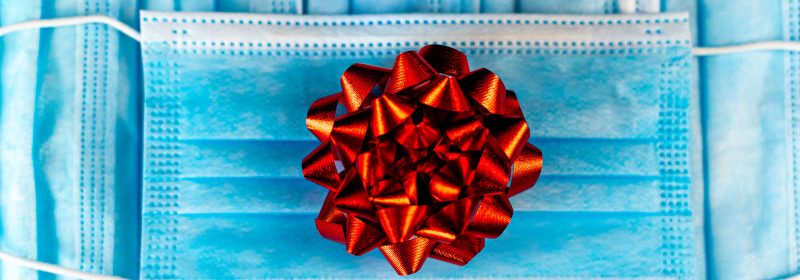Is Christmas cancelled? Your big COVID questions, answered

For our free coronavirus pandemic coverage, learn more here.
With many mandates lifted and, finally, the freedom to travel and see who we please this Christmas, it’s a relief only matched by the questions that same freedom brings.
This is because though the NSW government insists it is “treating people like adults” and urges residents to take “personal responsibility”, cases of the highly contagious Omicron are rising steeply with health authorities anticipating the state could see 25,000 COVID-19 cases a day by the end of January.
Taking precautions ahead of Christmas and on Christmas Day, may not be ideal, but may give the gift of health to those we love.Credit:Getty
Here are some of the big questions about how to make Christmas a super spread, not a super-spreading event.
I’ve got a celebratory event this week, should I go?
In a widely shared post on Sunday, clinical immunologist Dr Dan Suan suggested we reconsider our events for the upcoming week so Christmas Day celebrations don’t turn into a “simultaneous super-spreader event”.
For the ones we can’t or don’t want to miss, UNSW epidemiologist Professor Mary-Louise McLaws says there are measures we can take.
Catch-ups at home or outdoors, with take-away from your favourite restaurant “would certainly help reduce the risk”, she says.
McLaws also recommends only catching up with people who have recently had their second shot or their booster shot, which adults are eligible for five months after full vaccination.
“If you have received your second dose of vaccine of Pfizer since October, you’re likely to have a good level of neutralising antibodies,” says McLaws, who is a member of the World Health Organization (WHO) Health Emergencies Program Experts Advisory Panel for Infection Prevention and Control Preparedness, Readiness and Response to COVID-19.
Anyone who had their second dose more than four months ago however “is at high risk of spreading and acquiring infection” and those who had AstraZeneca “will not have any vaccine effectiveness against Omicron”.
What about Christmas shopping?
Although it’s not mandated, wear a face mask indoors. “That means over your nose,” McLaws says. “I know it’s hot, but if it’s under your nose you have the risk of breathing in or breathing [the virus] out through your nose, to others.”
I have a loved one I want to see at Christmas, but their immune system is compromised. What should I do?
Get tested. If you don’t have symptoms do a rapid antigen test two days in a row (to increase accuracy) to make sure you’re negative. For this purpose, they’re “very reliable”, McLaws says. If you do have any symptoms, get tested at a clinic and ask everyone who is coming to get tested too.
If you can celebrate outdoors, do, and avoid hugging or kissing. “I know that sounds very sad but give each other an IOU to hug and kiss,” McLaws says. “That should reduce the potential risk.”
And what about unvaccinated relatives?
The unvaccinated are at risk of spreading and acquiring the Omicron variant.
“After four months, people who have been vaccinated may not express symptoms, but they are still as infectious as if they hadn’t been vaccinated,” McLaws says. “But because they’ve been vaccinated their antibodies rush down and remove the virus very rapidly.”
This means they are infectious for a much shorter period of time.
“And if the unvaccinated has Omicron, basically everybody is at risk.”
In short: ask them to get tested before you see them.
I’ve booked a holiday, can I go?
If it’s an option, it’s much better to drive, McLaws says. Would she go on a plane overseas right now? “No.”
If you do decide to travel, you’re less at risk if you’ve had a booster shot and, she advises keeping a mask on at all times, except for when you’re eating and drinking.
“A concern about Omicron is that it can last in the air for longer and in a plane you’re in an enclosed environment.” It might not be the most comfortable way to travel, but it’s the responsible, ethical thing to do, she says.
“Even when you use the bathroom – there’s no airflow change there… Masks can save your life. Keep your mask on.”
It all feels endless. If we can’t beat this, what’s the point?
“We have to practise being long-term survivors,” McLaws, who would like the government to step up by bringing booster shots forward, making rapid antigen tests available for free and bringing back mask-use indoors.
“Yes, we’re into our second year, and it’s exhausting, but you don’t want a lot of people having unpredictable adverse events like long COVID.”
Even people who haven’t been hospitalised, are at risk of long COVID.
“The symptoms don’t always happen in the first week, the first month or even the first two months,” McLaws explains. “It can happen much later, and it includes anxiety and depression. Long-COVID includes a multiple of symptoms. It’s not nice.”
Suan, in his video, said we have to tap into the instinct to protect family, friends and the vulnerable, as we’ve done previously during the pandemic. “We’re going to have to summon that deep good one more time.”
Make the most of your health, relationships, fitness and nutrition with our Live Well newsletter. Get it in your inbox every Monday.
Most Viewed in Lifestyle
From our partners
Source: Read Full Article
